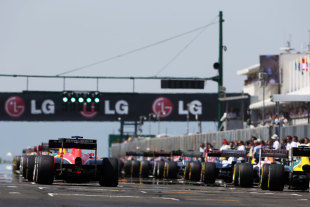

Sometimes, writing about F1 feels a bit like being a DJ in possession of only three records. We keep playing the same songs, over and over and over again, hoping that this time it will sound slightly different.
Or maybe it's more like manning the decks at a silent disco, an audience all dancing to their own tunes while you twiddle your thumbs and wait for something exciting to happen.
There is no denying that Formula One is running headfirst into a crisis largely of its own making, and one that could herald the slow but inevitable decline of the sport. It has been widely reported that last year's television figures saw a significant drop on years past, thanks to a combination of a change of broadcaster in China and a move to subscription-only coverage in several key markets.
It's also oft been said that declining TV stats lead to a drop in sponsorship, either from existing sponsors paying less to reflect their diminished reach, or from potential sponsors backing out or negotiating low-cost deals. Given that the sport's financial revenues are not split evenly between the teams, it goes without saying that smaller television audiences make it harder for the mid-fielders and backmarkers to make ends meet. Balanced books are little more than a pipe dream for the majority.
Which is why it is essential for Formula One to find a way of capping the cost of taking part, and why the F1 Strategy Group would be best served by being made up of representatives from all 11 teams, whatever was agreed in the memoranda of understanding that are currently sitting in for a Concorde Agreement.
Because while it has been argued that all teams signed their MoU with their eyes open, signing said documents made the difference between competing and departing. The weakened FOTA and preferential deals offered to a number of outfits left the smaller teams between a rock and a hard place when it came to negotiating.
If the teams, commercial rights holder, and FIA can find a way of controlling costs - either through standardising certain components or by agreeing on a cap - then Formula One has a bright future ahead of it. But the current desire of the F1 Strategy Group seems to focus on leading the sport down the path of supplier and customer teams, even though FIA president Jean Todt said in Bahrain that he was vehemently against the idea, which the Frenchman said was not in the spirit of Formula One.
Unfortunately, that was a personal opinion - as a ruler by consensus, Todt must go with what has been agreed, even if it contradicts his own desires.
Sadly, the smaller teams continue to struggle, and to shout about the difficulties they face, but only fans and media appear to be listening. The May 1 meeting on cost controls will see all eleven teams take part, but it would take a greater optimist than myself to predict a positive outcome after so much time spent shooting the sport in the foot.
